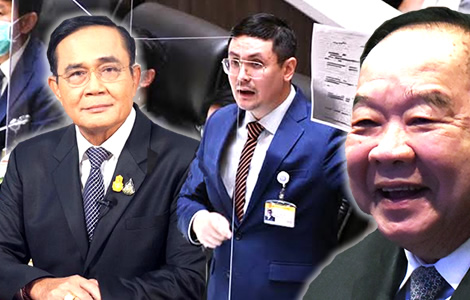The anticipated floundering of key electoral reform bills by Monday, August 15th is also a matter expected to be ultimately adjudicated by the Constitutional Court as the ballot system used in the next General Election will sway its outcome with the changes proposed last September likely ultimately to hand a decisive win to the Pheu Thai Party which is currently riding high in national opinion polls, particularly in Bangkok.
The Thai parliament heard on Thursday from leading opposition Move Forward Party MP, Rangsiman Rome, that the kingdom was facing a constitutional crisis as questions swirl over the status of Prime Minister Prayut Chan ocha after August 23rd next. Government spokesman, Thanakorn Wangboonkongchana, urged the public to await the decision of the Constitutional Court on the matter. At the same time, a parliamentary meeting on Thursday failed to reach a quorum, as has been the case now for several days, a situation which could see urgent and critical legislation to change the country’s electoral laws flounder if they are not passed by Monday, August 15th. The electoral system used in the next General Election will be the most important factor in determining the outcome with the changes proposed and passed by parliament, in a first reading last year, likely to give the country’s leading opposition party, Pheu Thai, an emphatic victory in the next poll due to be held between now and March 2023.

In the Thai parliament on Thursday, a prominent MP for the progressive Move Forward Party described the current state of politics in the kingdom as a constitutional crisis as he supported an attempt by the leading opposition Pheu Thai Party to have the House of Representatives weigh in on the growing unease over the status of Prime Minister Prayut Chan ocha’s tenure in office which according to a recent public opinion poll and many legal observers is due to expire on Tuesday, August 23rd next.
This is contrary to the view of a legal team of experts within Thailand’s lower house which has ruled that the premier’s term in office will only expire on June 8th 2027, 8 years after he was appointed to the role by the King following his election in parliament after the March 2019 General Election.
House turns down move by Move Forward Party and Pheu Thai to weigh in on Prime Minister’s term
On Thursday, the Deputy Speaker of the House of Representatives turned down attempts by Mr Rangsiman and Maha Sarakham MP Sutin Klangsaeng of the Pheu Thai Party to have the matter taken up by the house for consideration.
The MPs argued that the approaching deadline meant that the issue must be clarified so as not to plunge the country into chaos.
A National Institute of Development Administration (NIDA) poll published on Sunday showed that 64.25% of the public thought the Prime Minister, who assumed office as the leader of the National Council for Peace and Order (NCPO), the former junta, on the 24th August 2014, should resign by August 23rd 2022 having occupied the role for 8 years.
Long foreseen legal conundrum has 3 interpretations as to when the Prime Minister must resign
Section 158 of the 2017 Constitution which came into force on April 6th 2017, states that ‘the Prime Minister shall not hold office for more than eight years in total, whether or not holding consecutive term. However, it shall not include the period during which the Prime Minister carries out duties after vacating office.’
Status of the Prime Minister’s term in office
Constitutional issue over the Prime Minister’s term of office which may be due to expire in August 2022
The legal conundrum is when did the Prime Minister’s term commence and therefore when does the 8-year limited period expire?
The opposition and some constitutional experts suggest that it commenced on the day he was appointed in 2014.
This point of view received a boost this week when notes of a meeting of the 2017 Constitutional Drafting Committee emerged dated September 7th 2018 in which the esteemed chairman, Meechai Ruchuphan, stated this point of view which was seconded by a retired judge of the Constitutional Court, Mr Suphot Khaimuk who acted in the role as Deputy Chairman of the committee.
Radical new Thai constitution is now in the hands of the Thai people who vote in August
The 2017 Constitution was first published in 2016 by the committee led by Mr Meechai and ratified by a significant majority of voters that year in a controversial plebiscite held under strict constraints imposed by the military junta before coming into force in April 2017.
Radical 2017 charter initially designed to limit the power and scope of populist politics in Thailand
The radical nature of the charter was its thrust towards producing a political environment where political parties were bound to strict regulation under a powerful election commission.
The constitution also introduced a new one-ballot voting process and a party list system which severely disadvantaged the country’s leading Pheu Thai Party in the 2019 General Election but which was aimed at trying to ensure that no one party or person who may control such parties, gained a concentration of power.
However, as the controversy over the prime minister’s eligibility for office after August 23rd intensified, Mr Suphot, the former judge, on Wednesday, made a different assessment in which he suggested that the prime minister’s period in office only commenced when the charter came into effect on the 6th April 2017.
View gaining traction in political circles is General Prayut Chan ocha has over two more years to serve
This point of view is supported by Section 264 of the charter which states: ‘The Council of Ministers administering State affairs on the day prior to the date of promulgation of this Constitution shall be the Council of Ministers under the provisions of this Constitution until the new Council of Ministers appointed subsequent to the first general election under this Constitution assumes its duties.’
This would mean that Prime Minister Prayut Chan ocha’s term commenced on the 6th of April 2017 and would only expire on the 5th of April 2025.
This interpretation has been gaining currency this week and is believed to be the position favoured by the leader of the Palang Pracharat Party, Deputy Prime Minister and Prayut’s key confidant, General Prawit Wongsuwan.
Parliamentary chair tells opposition the matter must be addressed by the Constitutional Court, not MPs
In parliament on Thursday, the motion by the opposition to have it weigh in on the tenure of the prime minister was rejected by Mr Supachai Phosu, Second Deputy speaker of the House of Representatives who told the assembled MPs that the matter is something that should be referred to the Constitutional Court for a decision.
Srisuwan Janya, a key constitutional law activst has already approached key public bodies, including the country’s Election Commission requsting it expeditiously seeks a Constitutional Court ruling on the matter.
Speaking to reporters on Monday, August 1st, Deputy Prime Minister Wissanu Krea-ngam, the government’s key legal adviser, urged the opposition to refer the matter to the Constitutional Court for clarification.
This approach has been endorsed this week by key legal experts and former judges of the court who suggest that it is a clear-cut matter for it to adjudicate upon and the conclusion it reaches would be final and binding on all parties.
The facts of the matter are quite clear and Deputy Prime Minister Wissanu suggested that information and clarifications can be furnished to judges if so required by state officials.
Deputy Prime Minister Prawit Wongsuwan would temporarily assume role if General Prayut steps down
He did clarify that if the court ruled that the prime minister’s term expires on the 23rd of August 2022, then Deputy Prime Minister Prawit Wongsuwan would assume office with the House of Representatives Speaker Chuan Leekpai then tasked with convening a parliamentary meeting to select a new prime minister.
This uncertainty has long been foreseen but is becoming more pressing this week as the prospect of a General Election by the end of the year is rising with a poll to be called before March 2023 in any event.
At Thursday’s parliamentary hearing, the session had to be adjourned after 3 pm when the house deputy speaker found that there weren’t enough MPs present for a quorum.
Efforts this week in parliament to torpedo the new electoral laws passed at a first reading in September
This has been happening regularly this week as there appears to be a concerted effort afoot among key parties to defeat the latest reading of the new voting law which now looks like it will fall if not passed by August 15th next.
Prayut retains all the cards as Thailand may be pivoting back to a one-ballot election process
Matters are still uncertain as to what will happen in that event with one suggestion being that the act or law, as passed in its first reading in September last year, allowing for a dual ballot system and a divisor of 100 party list seats, will be accepted.
On the other hand, it is also widely accepted that the matter will be referred ultimately also to the Constitutional Court to decide with MPs for small parties remaining adamant and confident this week while briefing reporters that the 500 divisor formula will end up being the basis of the next General Election, no matter how it works itself out.
Reformed new electoral laws as proposed and passed at the first reading in September would hand Pheu Thai Party certain victory in the next General Election
The acceptance of the law as first proposed in September 2021 would be a major victory for the Pheu Thai Party and would be a key factor in allowing the party to win the next election perhaps with a landslide based on current opinion polls.
This was accepted by Deputy Prime Minister Wissanu Krea-ngam earlier this year and has become more likely as the party’s opinion poll ratings have soared with former Premier Thaksin Shinawatra’s daughter Paetongtarn Shinawatra emerging as the popular favourite as Prime Minister in the last National Institute of Development Administration (NIDA) poll at the end of June.
This has given rise, this week, to speculation and rumour in parliamentary circles that the Palang Pracharat Party and Pheu Thai Party as well as allied parties, were working together although the unpredictable and murky nature of Thai politics and the nature of the passage of these new electoral laws would strongly suggest caution before predicting what will happen next.
PM’s Office urges patience until court verdict
On Thursday, the Prime Minister’s spokesman Thanakorn Wangboonkongchana urged caution and patience.
He asked reporters to await the decision of the Constitutional Court on the matter of the Prime Minister’s status.
‘General Prayut will respect the court’s opinions because he has never thought of himself as being above the law. And he begs all sides to stick to the rule of law as well,’ he declared. ‘What is right is to let this matter be examined in accordance with the 2017 constitution regarding the qualifications of the prime minister. Please listen to what the court has to say. Don’t rush to interpret the charter on your own and without sufficient understanding.’
Join the Thai News forum, follow Thai Examiner on Facebook here
Receive all our stories as they come out on Telegram here
Follow Thai Examiner here
Further reading:
Prayut retains all the cards as Thailand may be pivoting back to a one-ballot election process
Senator warns that Paetongtarn Shinawatra or Ung Ing, Thaksin’s daughter, is wrong for the job
Legal pot does not appear to be working for Anutin’s Bhumjaithai Party in latest opinion poll
New Shinawatra may lead the next quest for power as Pheu Thai Party aims for 14 million members
Bad news for PM and Palang Pracharat in Bangkok on Sunday as resurgent Pheu Thai Party wins big
By-election polls amid a weak economy and rising food prices may mean a 2023 General Election
Wife of deposed Bangkok MP Sira campaigns for his job based on his 3 years of service to people
Move against Pheu Thai, the kingdom’s biggest political party, over it’s alleged links to Thaksin


















